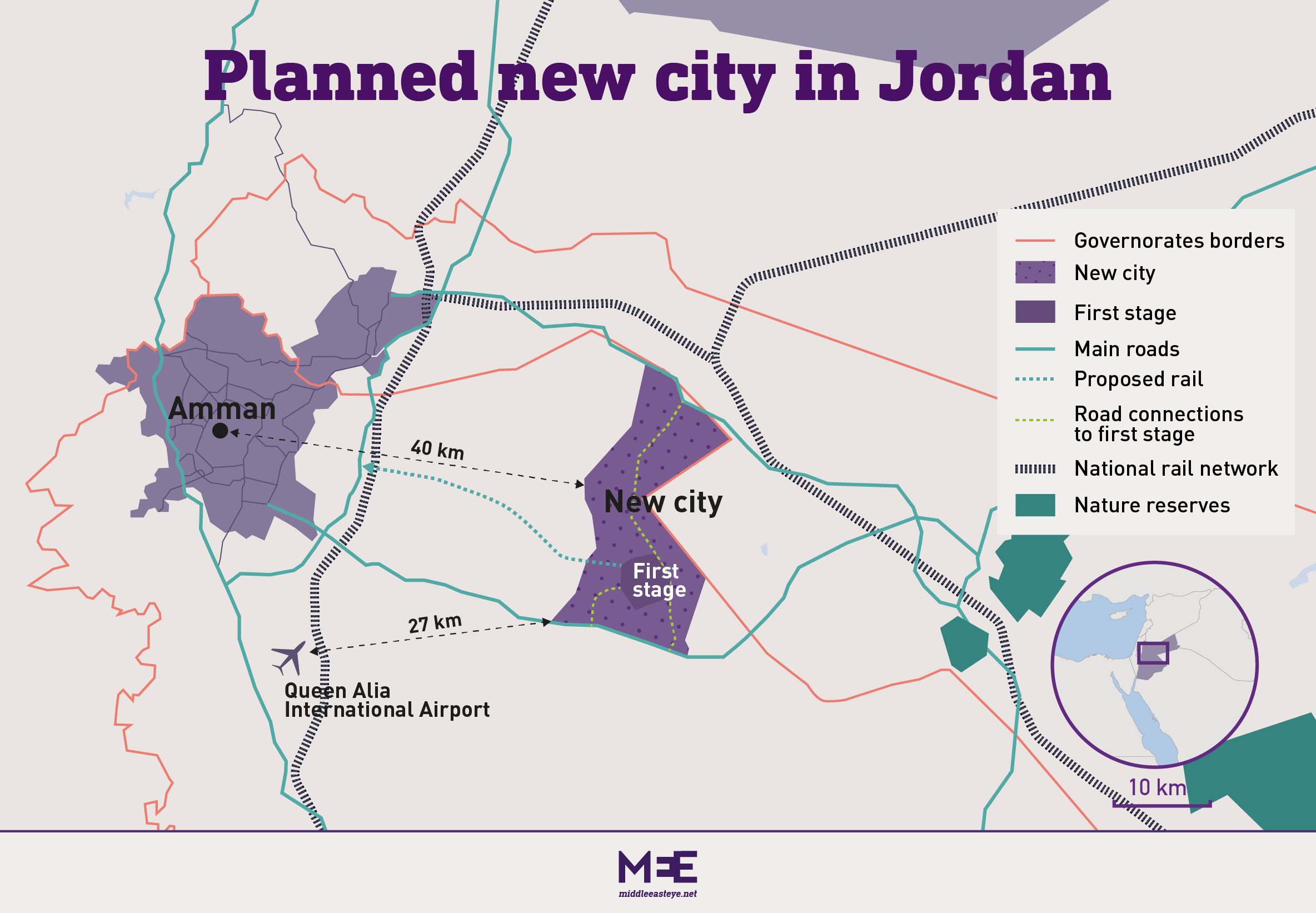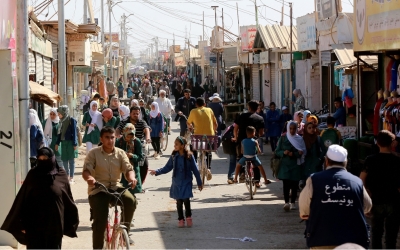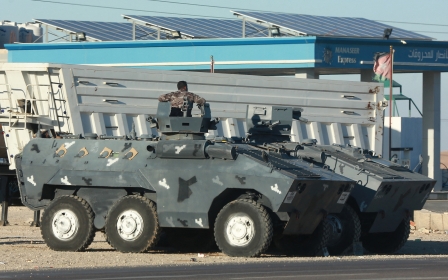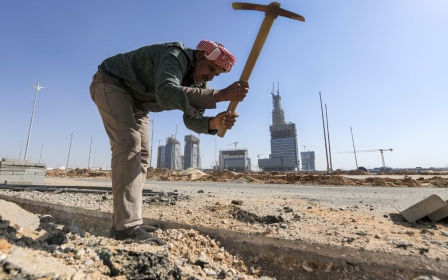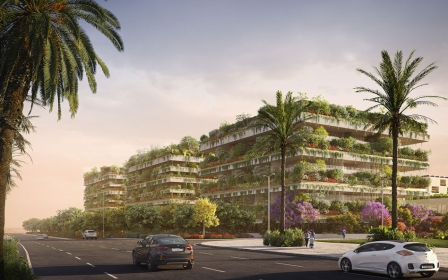Debt-ridden Jordan follows Egypt's lead and plans new city in the desert
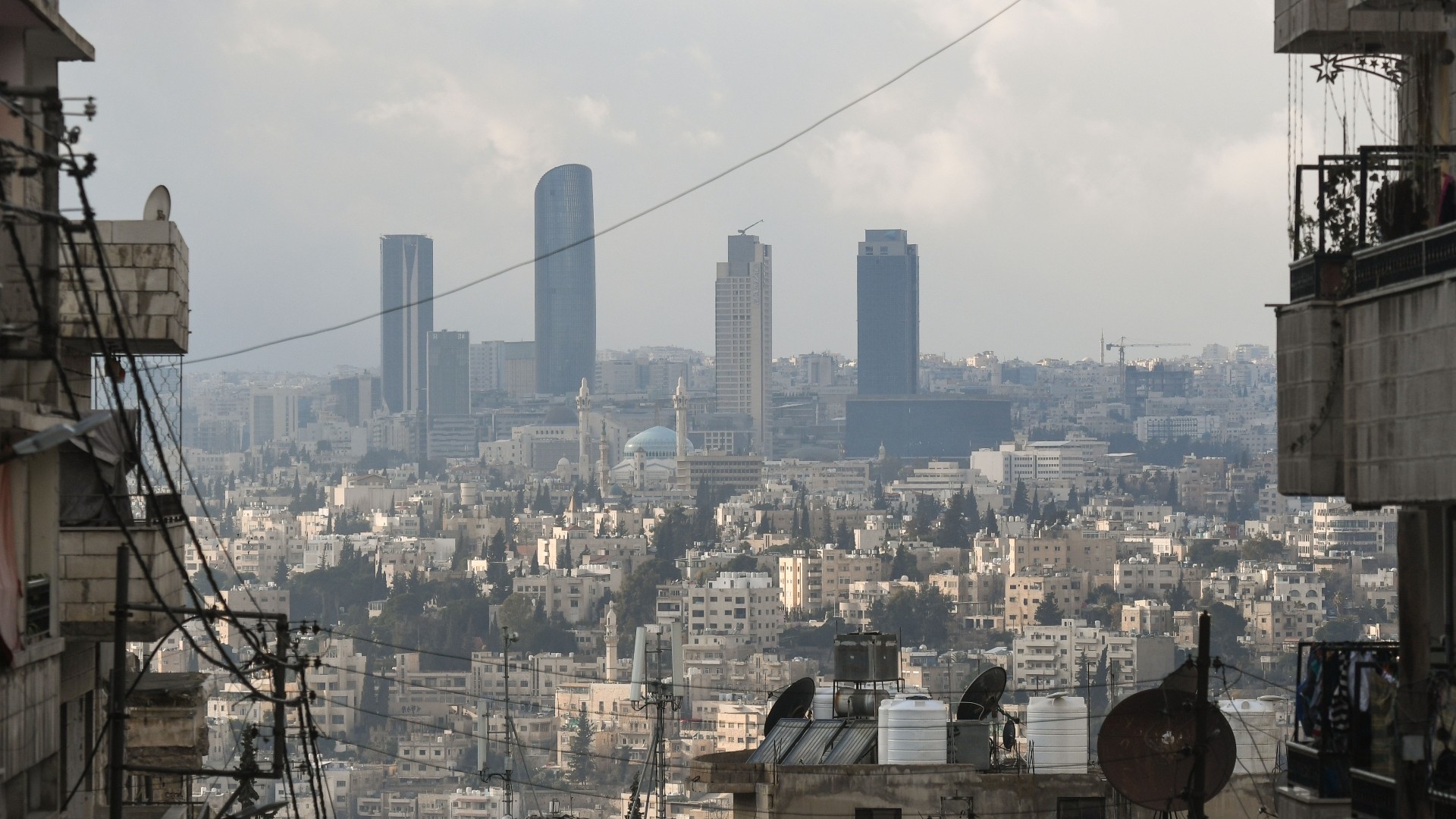
Burdened with debt, a tetchy relationship with the IMF, reliant on its Gulf neighbours and building a new city in the desert. No, this is not Egypt we’re talking about. It’s Jordan.
The Jordanian government on Tuesday announced a grand plan to follow in Egypt’s footsteps and begin construction of a new city 40km east of Amman.
Set to be constructed on 266,000 dunums of land, the prospective city will be located at a crossroads where highways connect Jordan with Saudi Arabia and Iraq.
Jordanian officials say they expect a million people to eventually move to this corner of desert, with 157,000 residents by the end of the first phase in 2033. The overall project, they say, will be completed by 2050, and ease the pressure of growing populations in large cities such as Amman and Zarqa.
New MEE newsletter: Jerusalem Dispatch
Sign up to get the latest insights and analysis on Israel-Palestine, alongside Turkey Unpacked and other MEE newsletters
Communications Minister Faisal Shboul said: “The new city will be built on state land and is surrounded by lands owned by the state. About 83,000 new jobs will be created in the first phases by 2033 and another 90,000-100,000 new jobs both direct and indirect in the final stage.”
The Egyptian experiment
Clearly, this is a very expensive plan. And that’s concerning for many Jordanians struggling in the kingdom’s wheezing economy, where the 2023 budget stretches to just $2.5bn and national debt stands at $45bn.
On social media, Jordanians have worried that the only way such a megaproject can be completed is by taking on more debt, as Egypt has done.
Egyptian President Abdel-Fattah el-Sisi is constructing a grandiose new administrative capital 45km east of Cairo, at a cost of $58bn. Yet his country has taken loans from the IMF three times in the past six years, totalling $20bn. Meanwhile, the Egyptian pound has been plummeting, hitting a new low against the US dollar on Wednesday.
'In Jordan, our national debt is $45bn and we cannot bear it. What would happen if we borrowed more?'
- Musa Hantash, MP
“Egypt with all its resources has become bankrupt after they established the new administrative city. What will happen to us?” one anxious Jordanian tweeted.
That’s a sentiment shared by Musa Hantash, a Jordanian MP from the Islamist Reform bloc, who told Middle East Eye that the kingdom should be developing its infrastructure rather than building a whole new city from scratch.
“We need to give priority to important sectors such as industry. The new city is a distraction from the deficit that the government is facing and its inability to improve the economic situation,” he said.
Hantash noted that after years of developing the new capital and other megaprojects, Egypt’s national debt is around $150bn.
“In Jordan, our national debt is $45bn and we cannot bear it. What would happen if we borrowed more? I also worry about the increase of corruption and thefts which often increase in such programs,” he said.
The population problem
The idea of a new city was first announced in 2017 by the Hani al-Mulki government, but the prime minister who followed him, Omar Razzaz, changed course and promised instead to improve public transportation and lower traffic congestion. Those promises were never fulfilled, but Amman’s population continued to grow.
Samih Maayteh, a former minister, has argued that population expansion is happening whether people like it or not, and that can be faced either in a haphazard manner or with a well thought out plan, like this new city.
“The new city is a positive and important decision, especially because it allows for the development of the state land and the fact that it is outside the capital,” he said.
Shboul, the communications minister, has tried to temper debt concerns by saying funds will be shared with the local private sector and international funders. Nevertheless, he acknowledged “the government will contribute to this project and the government might still borrow locally and internationally to complete this national project”.
Civil engineer Murad Kalladeh warns that even beginning to get such a project off the ground is far from easy.
“This requires a huge amount of money in order to ensure its sustainability,” he told MEE.
In the first phase, the government plans to spend $70m a year from 2025, money spent chiefly on excavation and construction.
“What the government has put aside for this project - $70m - is very small compared to the amounts of investment needed for the city’s infrastructure.”
According to Kalladeh, the chance of a 30 percent population increase in parts of the capital will remain. He argued that a new city in the desert will not be particularly attractive for people in Amman, “unless the government makes the land available at lower prices and a strong transport system to the city is readily available”.
However, former deputy prime minister Jawad Anani dismissed concerns that constructing a whole new city in the wilderness will prove very challenging, telling MEE the project can be “executed easily”.
“The idea will work if the government gives land for free in return for developers building on it,” he said.
“There is a need to look to the next 100 years,” he added. “Many world capitals are making similar changes, like in Egypt and Brazil, because of the high population density.”
Middle East Eye delivers independent and unrivalled coverage and analysis of the Middle East, North Africa and beyond. To learn more about republishing this content and the associated fees, please fill out this form. More about MEE can be found here.


